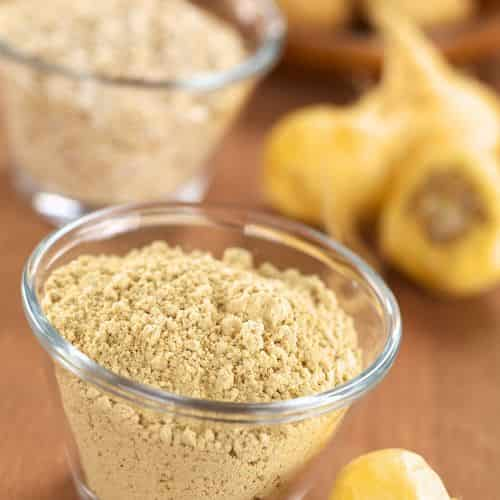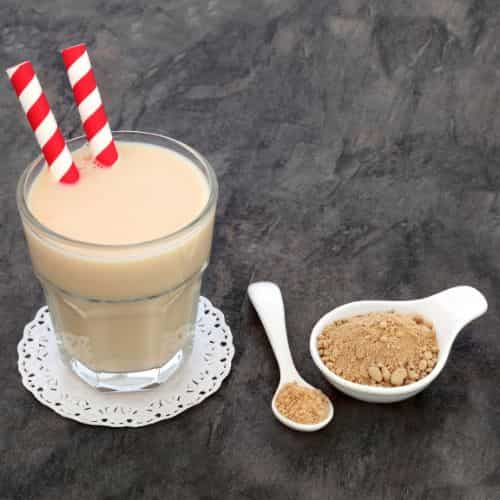Maca for Menopause: Can it Alleviate Symptoms?
Are you looking for natural remedies to alleviate annoying menopause symptoms?
Table of Contents
ToggleMaca might be worth considering. Maca is an herb that has been used for centuries in Peru to reduce menopause symptoms like hot flashes, night sweats, mood swings, and irregular periods.
What Is Maca?

Maca is a cruciferous vegetable and has been a medicinal staple for thousands of years.
This hearty plant, which has a similar appearance to that of radish, is typically harvested specifically for the root.
Maca root is rich in fiber, amino acids, vitamins, and minerals.
In recent years, maca has gained the status of a superfood for its list of health benefits.
How Can Maca Benefit Menopausal Women?
Maca root possesses a long list of benefits for menopausal women.
Between balancing hormones or improving mental health and libido, maca root can help make menopause symptoms more manageable.
Maca for Mental Health
Hormonal changes during menopause can have detrimental effects on mental health. Some women experience heightened senses of anxiety, stress, and even depression during perimenopause and menopause.
Studies have linked maca root supplementation in menopausal women with reduced feelings of anxiety and depression.

Maca root is rich in flavonoids which have been linked with a reduction in anxiety and an improvement in mood. Dietary flavonoids also have a neuroprotective effect on the brain, promoting memory, learning, and cognitive function.
Maca and Hormones

From hot flashes to anxiety stemming from hormonal changes, many women experience great discomfort during menopause.
Among its vast applications, hormone balancing is a key use for maca in menopausal women.
Maca can increase the body’s estrogen and progesterone production, which will effectively minimize undesirable menopause symptoms.
Maca has also been linked to decreased production of cortisol, a hormone associated with stress in the body.
Some studies have even investigated maca supplementation as a powerful non-hormonal alternative to hormone replacement therapy in menopausal women.
Maca for Libido
Another unfortunate side effect of plummeting estrogen levels during menopause is loss of libido.
In addition, some women experience pain during intercourse which further minimizes sexual drive.
Diet supplementation with maca root has been heavily associated with improvement in sexual health for centuries.
Studies show maca measurably reduced sexual dysfunction in postmenopausal women in addition to soothing anxiety and depression.
How to Incorporate Maca into Your Diet
The good news is that adding maca to your diet is very simple. The bonus? It’s delicious!
You can purchase maca in powder form, which you can easily add to coffee or tea, smoothies, oatmeal, and more.
The subtle nuttiness of maca powder pairs well with many flavors. You can even add maca powder to your sweet indulgences for an extra boost in nutrients.

Maca is also sold in supplement form, a great way to stay on top of daily intake. Supplements also retain their nutrient value longer as they are not exposed to oxygen, such as in the powdered form.
Maca Recipe Ideas
Whether you have a sweet tooth or enjoy more of the savory side, adding maca is a simple way to mitigate menopause symptoms.
Maca Dosage
There currently is no medically optimal standardized dose of maca root.
However, 1.5-3 grams of maca per day has been used in many studies to promote positive health outcomes.
Maca has a pleasant nutty flavor, so it is very easy to incorporate into your diet. If you do not enjoy the taste, maca supplements are also a good option.
FAQ
Who should avoid maca?
Studies generally regard maca root as safe and not associated with negative side effects.
Since it is high in vitamin K, maca root may not be right for you if you take blood thinners. Vitamin K assists in forming blood clots and may counteract certain medications.
Check with your doctor prior to taking this supplement if you are concerned about medication interactions.
What does maca taste like?
Maca is generally described as having a nutty flavor and is usually well-liked. Many describe maca as earthy and aromatic, as well as containing notes of butterscotch.
It is important to note that the taste varies depending on the type of maca you purchase.
- Yellow maca root is the most common type of maca and is considered mild and nuttier than other types.
- Black maca root is less common but contains a roasted nut flavor and is more bitter.
- Lastly, the red maca root flavor is similar in taste to yellow maca but is the sweetest option.
What is the best time of day to take maca?
Since maca has energy-boosting properties, it is best to take maca root for breakfast, lunch, or an early snack.
Maca has also been linked to improvements in mood.
What is the best way to consume maca?
Maca should be consumed with other foods to increase its absorption.
It is best to avoid exposing maca to very high temperatures to maintain its nutritional value. Incorporating maca into raw foods, such as smoothies or no-bake treats, is a great solution.
Further, you can add maca powder to already-cooked foods such as oatmeal for some extra flavor and nutrients.
Where can I buy maca?
Maca is widely available in many stores including health food stores, vitamin stores, Target, Walmart, Amazon and other online stores.
Most often, you will find the powder version of this root.
The Bottom Line
Maca supplementation can not only help mitigate menopausal symptoms but also promote overall health.
Maca is easy to incorporate into your diet with its mild flavor and many uses for cooking. If you are searching for an all-natural way to manage menopause symptoms, maca may be the right choice for you.
“Maca for menopause” was written by soon-to-be Registered Dietitian Stephanie Maurici. Edited by Dr. Su-Nui Escobar, RDN.

Dr. Su-Nui Escobar, a Registered Dietitian/Nutritionist in Miami, FL, is dedicated to empowering women in perimenopause and menopause to live healthier, more satisfying lives.
With a doctorate in clinical nutrition from the University of North Florida, she has expertise in menopause and weight loss, including the unique challenges faced by those on weight loss medications.
Su-Nui’s passion for her field is evident in her previous role as the Academy of Nutrition and Dietetics spokesperson.


